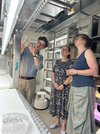How can we achieve sustainable, resource-efficient agriculture? This question was discussed by two SPD state politicians, Juliane Kleemann and Elrid Pasbrig, with scientists in Gatersleben.

Juliane Kleemann was particularly impressed by the gene bank’s cold storage cells, spike collection, and herbarium, as well as the background to the wild relatives of our cultivated plants today. “There is clearly a lot of potential in wild varieties that has yet to be fully realised,” explained the SPD parliamentary group spokesperson for climate, energy and the environment in the Saxony-Anhalt state parliament. She visited the IPK on Wednesday with her parliamentary group colleague Elrid Pasbrig, who is responsible for agriculture. The SPD politicians aimed to find out about current research at the IPK and, above all, to discuss solutions for efficient, sustainable and resource-conserving agriculture. The wild relatives of barley, wheat, and so on are very important building blocks on the way there. “Exploring the great genetic diversity of these wild varieties is exciting, but we are also interested in transferring genetically advantageous traits, such as resistance, to our modern elite varieties,” explained Prof. Dr. Nils Stein, head of the department ‘Gene Bank’, during a short tour.
“Here at the IPK, we are developing the scientific basis for preparing our crops for the consequences of climate change, thereby making an significant contribution to sustainable, resource-efficient agriculture,” explained Prof. Dr. Nicolaus von Wirén, the IPK’s Managing Director. He provided specific examples to illustrate this as clearly as possible. For instance, one current research project examines how wheat can adapt genetically to warmer winters. Another project involves developing a modified root structure that enables plants to utilise nitrogen deposits in the soil that were previously unavailable. “The aim is to identify the responsible genes and transfer them into elite varieties,” Prof. Dr. Nicolaus von Wirén explained. “Methods such as CRISPR Cas gene scissors are of great importance for this.” Dr. Robert Hoffie, head of the independent research group ‘Biotechnology and Genome Editing’, then demonstrated how the gene scissors work to the two SPD politicians.
While the scientific community almost unanimously recognises the benefits of green genetic engineering, some of the population still have strong reservations and concerns. “We need to communicate not just facts, but also link them with positive emotions that stick with people,” said Juliane Kleemann, who is also the chairwoman of her party in Saxony-Anhalt. In addition, terms such as ‘mutation’ need to be explained, as they tend to have a negative connotation for many people. Juliane Kleemann is focusing on a broad dialogue throughout this process, aiming to “utilise the strengths of individual perspectives, incorporate diverse viewpoints, and thereby foster understanding and consensus”.
Meanwhile, Elrid Pasbrig called for a more positive approach to the topic of green genetic engineering. “We need a more optimistic approach,” emphasised the state parliament member, who also believes that politicians have a duty. “We must now take the next step.” The EU Parliament and the EU Commission are currently negotiating a revision of European genetic engineering legislation with the Council in Brussels. Dr. Jens Freitag, Head of the IPK’s Managing Office, said that a new regulation in the interests of science would also strengthen Germany as a research location. “We also want to contribute our scientific expertise to this topic.”